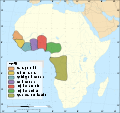Diaspora
Diaspora refers to the dispersion or spread of any people from their original homeland. In a medical context, it often refers to the spread of diseases or health-related issues among a specific population or group.
Overview[edit]
The term "diaspora" is derived from the Greek word "διασπορά" which means "scattering or dispersion". It is often used to describe the mass dispersion of populations from their homeland, such as the Jewish diaspora after the Babylonian exile. In a medical context, diaspora can refer to the spread of diseases or health-related issues among a specific population or group. This can occur due to various factors such as migration, conflict, or natural disasters.
Medical Diaspora[edit]
In the field of medicine, the term "diaspora" is often used to describe the dispersion of diseases or health-related issues among a specific population or group. This can occur due to various factors such as migration, conflict, or natural disasters. For example, the HIV/AIDS diaspora refers to the spread of the disease among certain populations or regions.
Diaspora and Public Health[edit]
The concept of diaspora is important in public health as it can help in understanding the spread of diseases and in planning effective interventions. For instance, studying the diaspora of a disease can help in identifying the populations at risk and in developing strategies to control the spread of the disease.
Diaspora and Health Disparities[edit]
Health disparities often exist among diaspora populations due to factors such as lack of access to healthcare, language barriers, and cultural differences. These disparities can lead to higher rates of certain diseases and poorer health outcomes among these populations. Therefore, addressing these disparities is a key aspect of public health.
See Also[edit]
Ad. Transform your life with W8MD's Budget GLP-1 injections from $75


W8MD offers a medical weight loss program to lose weight in Philadelphia. Our physician-supervised medical weight loss provides:
- Weight loss injections in NYC (generic and brand names):
- Zepbound / Mounjaro, Wegovy / Ozempic, Saxenda
- Most insurances accepted or discounted self-pay rates. We will obtain insurance prior authorizations if needed.
- Generic GLP1 weight loss injections from $75 for the starting dose.
- Also offer prescription weight loss medications including Phentermine, Qsymia, Diethylpropion, Contrave etc.
NYC weight loss doctor appointmentsNYC weight loss doctor appointments
Start your NYC weight loss journey today at our NYC medical weight loss and Philadelphia medical weight loss clinics.
- Call 718-946-5500 to lose weight in NYC or for medical weight loss in Philadelphia 215-676-2334.
- Tags:NYC medical weight loss, Philadelphia lose weight Zepbound NYC, Budget GLP1 weight loss injections, Wegovy Philadelphia, Wegovy NYC, Philadelphia medical weight loss, Brookly weight loss and Wegovy NYC
|
WikiMD's Wellness Encyclopedia |
| Let Food Be Thy Medicine Medicine Thy Food - Hippocrates |
Medical Disclaimer: WikiMD is not a substitute for professional medical advice. The information on WikiMD is provided as an information resource only, may be incorrect, outdated or misleading, and is not to be used or relied on for any diagnostic or treatment purposes. Please consult your health care provider before making any healthcare decisions or for guidance about a specific medical condition. WikiMD expressly disclaims responsibility, and shall have no liability, for any damages, loss, injury, or liability whatsoever suffered as a result of your reliance on the information contained in this site. By visiting this site you agree to the foregoing terms and conditions, which may from time to time be changed or supplemented by WikiMD. If you do not agree to the foregoing terms and conditions, you should not enter or use this site. See full disclaimer.
Credits:Most images are courtesy of Wikimedia commons, and templates, categories Wikipedia, licensed under CC BY SA or similar.
Translate this page: - East Asian
中文,
日本,
한국어,
South Asian
हिन्दी,
தமிழ்,
తెలుగు,
Urdu,
ಕನ್ನಡ,
Southeast Asian
Indonesian,
Vietnamese,
Thai,
မြန်မာဘာသာ,
বাংলা
European
español,
Deutsch,
français,
Greek,
português do Brasil,
polski,
română,
русский,
Nederlands,
norsk,
svenska,
suomi,
Italian
Middle Eastern & African
عربى,
Turkish,
Persian,
Hebrew,
Afrikaans,
isiZulu,
Kiswahili,
Other
Bulgarian,
Hungarian,
Czech,
Swedish,
മലയാളം,
मराठी,
ਪੰਜਾਬੀ,
ગુજરાતી,
Portuguese,
Ukrainian














